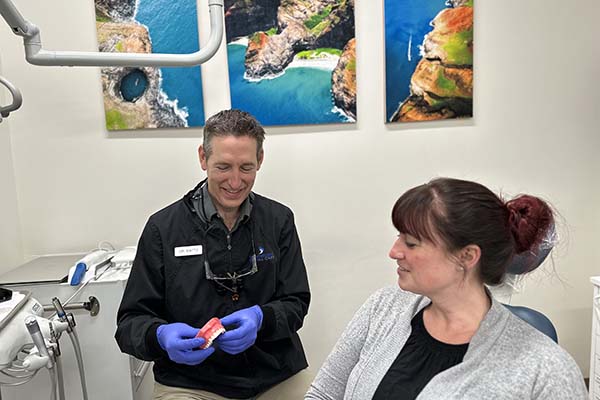How Often Should I Schedule a Teeth Cleaning With My General Dentist?

Visiting a general dentist for routine cleanings is essential for preventing common dental problems such as tooth decay or gum disease. While brushing and flossing every day can help remove a majority of bacteria and plaque from the teeth, it is impossible to completely remove all buildup. Frequently scheduling dental cleanings makes it possible to address tartar buildup before it causes damage, and it gives the dentist an opportunity to examine the mouth for any issues that need to be addressed.
Scheduling routine cleanings with a general dentist
How often a patient should visit a dentist for a dental cleaning depends on the condition of the patient’s mouth and the presence of any bad oral habits, such as smoking or teeth grinding. In general, the average patient with healthy gums should schedule a cleaning at least twice a year.
An easy way to create a habit of maintaining a strict cleaning schedule is to set an appointment for six months in the future after every visit. For patients who smoke, suffer from diabetes, or have a history of periodontal disease, the dentist may recommend more frequent visits as a preventative measure. As certain conditions increase the risk of gum disease, these cleanings help prevent it from occurring or keep it from progressing to the more advanced stages.
Knowing what to expect during a cleaning
For some patients, dental phobia or general anxiety about visiting the dentist can keep them from making a cleaning appointment. Knowing what to expect during a cleaning can help ease these anxieties.
Dental cleaning tools
There are several basic tools dentists and hygienists use to clean and examine the mouth:
- Dental mirror: A handheld mirror is used to help the dentist view hard-to-reach places from many different angles.
- Scaler: Scalers are instruments with hooked ends used to scrape away calculus on the teeth, especially above the gum line
- Explorers and probes: Similar in appearance to scalers, explorers and probes are used to look for cavities and measure gum recession.
- Suction devices: A low-suction saliva ejector is used to remove excess saliva and water during the cleaning process.
- Air and water syringe: Using a handle on a long, thin nozzle, the syringe is used to spray a stream of water onto debris in the mouth or to blow air on teeth to quickly dry them.
- Polisher with prophy cup: A special paste is applied to a rotating dental polisher with an attached prophy cup to polish each individual tooth.
Pain and bleeding
It is not uncommon for patients to experience some level of bleeding after a cleaning, especially if the patient does not frequently floss or there is a lot of buildup on the teeth. Cleanings by a general dentist can cause gum sensitivity that lasts for a couple of days following the appointment. While having teeth cleaned should not cause excessive pain, trauma to the mouth, decay or jaw disorders can make patients uncomfortable during the process.
Appointments for children
Parents who have a baby or toddler may be wondering when children should start going to the dentist and what the visits will entail. Most dentists recommend children have their first appointment once they start getting teeth, and this may range from eight to 12 months. Even if a child has no teeth by one years old, it is still a good idea to schedule an appointment to check their gums and make sure everything is progressing normally.
For many young children, the initial appointment is designed to introduce them to the office, show them the chair and varying tools, and get them used to the routine. The subsequent visits will include the regular professional cleaning and exam.
Dental exam
During the visit for teeth cleaning, the dentist will also conduct a thorough exam of the teeth, gums, and other soft tissues of the mouth. This includes checking for early signs of decay, gum disease, and oral cancer. About once a year, the dentist takes X-rays of the teeth to see underlying structures that are not visible otherwise. If the dentist detects any potential issues, he or she will discuss potential treatments with the patient.
Conclusion
Visiting a general dentist at least twice a year can limit the amount of dental work a patient needs by preventing dental decay and gum disease from progressing. If it has been a while since you have visited the dentist, make an appointment right away to ensure no problems have developed.
Request an appointment here: https://pearlcity.diamondheaddentalcare.com or call Diamond Head Dental Care at (808) 214-9287 for an appointment in our Pearl City office.
Check out what others are saying about our dental services on Yelp: General Dentist in Pearl City, HI.
Recent Posts
When your general dentist says you need an oral sedative, you might have questions. There are many reasons why you might want or need an oral sedative. You may experience a lot of anxiety, or you may need a procedure that can cause discomfort. General dentists use several different kinds of oral sedatives to help…
Tooth pain, also known as toothache, is a common issue that causes many people to seek professional dental care. Tooth pain can affect a person's everyday life, whether they are experiencing mild discomfort or severe, debilitating pain. A general dentist can diagnose and treat a variety of tooth pain, offering relief and improving oral health.This…
All general dentist preach the importance of good oral hygiene between dental cleaning visits for a reason. The long-term focus for general dentists is on helping their patients maintain a beautiful and healthy smile. The best way this is achieved is through good oral hygiene in between check-ups and dental cleaning visits. This article emphasizes the importance of oral…
When it comes to general dentistry practices, these offices typically include primary care dental providers. A general dentist focuses on diagnosing dental problems, treating dental issues, and overall oral health care. General dentists may provide gum care, teeth cleaning, root canals, veneers, bridges, and preventative dentistry. However, just as there are dentists that focus on…


